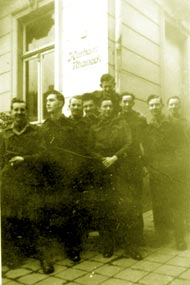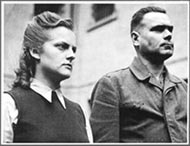
 |
 |
 |
 |
|
'1944-45, I did a lot in that time but the worst was yet to come when I was posted to war crimes.' (Tape 2, P.5). The United Nations War Crimes Group Commision (UNWCC) was established in October 1943 in order to ‘collect, record, and investigate evidence of war crimes and their perpetrators. In the immediate post-war period, responsibility for collecting evidence of war crimes rested with a variety of units attached to the Headquarters of the Allied Forces in Europe. In Germany, several investigation teams operated with the 21st Army Group (later British Army of the Rhine). [5] These units later merged to become the War Crimes Group (North-West Europe). After the war, in the early summer of 1945 Ron was in Cuxhaven (North-West Germany) when he saw his name selected for War Crimes. He was instructed to travel to Bad Oeyhausen (Nr. Hanover) where the War Crimes Group was formed. He was 19. During this time Ron’s duties included 'doing a little bit of office work, finding out where their last known address was and then trying to trace them up because we were working with the SBI, Special Bureau of Investigation, they did a lot of snooping around and then we had to follow up after them what had happened.' (Tape 1, P.12). Ron’s predominant work in War Crimes was transporting people to Alton Prison, in Hamburg or Minden prison, near Hanover. This involved going to suspect’s homes and formally arresting them. 'Three or four of us, fully armed, no messing. We did have a chappy, he didn’t do much (laughs) and when we went there (to peoples houses) he used to go around and see what there was, anything of importance, he used to take. I know it was against rules and regulations but he had a hell of a lot of stuff because he new darn well they wouldn’t be coming back.' (Tape 2, P.7). |

War Crimes Group H.Q

Irma Grese and Josef Kramer
|
It was at the end of the Second World War that the world became aware of what was to be known as, one of the most atrocious crimes committed against humanity - the Holocaust. As part of Hitler’s Final Solution to create a single Aryan race, concentration camps were established in occupied Europe. Bergen-Belson concentration camp, situated north of Celle, near Hanover, North-West Germany was liberated by British Forces on 15th April 1945. One of Ron’s duties whilst in War Crimes was to go to this concentration camp and transport Josef Kramer (Kommandant of Belson) and Irma Grese (who was in charge of the Belson death cells) to Minden prison (Nr. Hanover). When entering Bergen-Belson 'there were regiments guarding, they were the ordinary infantry. War Crimes we just went in, we had priority and the SBI were there, Special Bureau of Investigation.' (Tape 2, P.7). Ron and those he served with were 'in and out again, we didn’t hang around. You had to be de-loused.' (Tape 2, P.8). 'Core it was smelly dirty, to be quite frank the sooner we got out of that place the happier we were. I mean considering we were only in our twenties.' (Tape 2, P.9). Prior to Ron’s orders from the War Crimes Group to collect Kramer and Grese, he had little knowledge of the establishment of concentration camps and therefore the indescribable sights he would experience, never to be forgotten. 'We were all together and we were a good crew because we could look after one another. (Tape 1, P.10). It was a job, the job had to be done. We had to obey orders, that was it. We couldn’t fall back on anybody, if we were told to do it, we would have to.' (Tape 1, P.16). 'I mean I did have reoccuring dreams, what am I doing here why am I going through all this. (Tape 1, P.13). But I think the lord has looked after me, I’ve got no scars on my body, I’ve never had a broken bone in my body so yeah I was tough and all the blokes in War Crimes were.' (Tape 1, P.10). Ron's service with War Crimes North-West Europe ended in March 1948 when he returned home to England. |